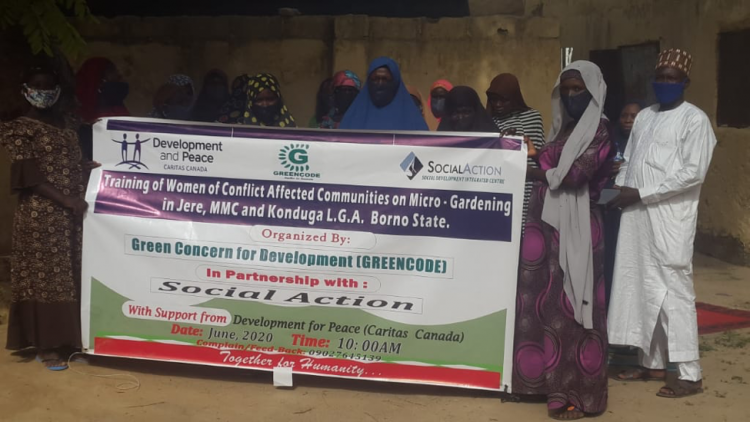
BORNO STATE REPORT
Against the backdrop of severe drought occasioned by climate change, coupled with the destruction of homes and farmlands induced by the Boko Haram insurgency in parts of Borno State, the Green Concern for Development (GREENCODE) and Social Development Integrated Centre (Social Action) have launched an initiative for the development of sustainable livelihoods of displaced populations through agriculture. The intervention project which is aimed at devising ways of ensuring food security and protecting the livelihoods of those gravely-affected by the ecological impacts of global warming and related conflicts, is supported by the Development for Peace (Caritas Canada). GREENCODE and Social Action have commenced a Training programme on micro-agriculture, for women in conflict-affected communities within Jere, MMC and Konduga LGAs, as part of efforts at addressing the prevailing challenges to livelihood which have been compounded by the COVID-19 pandemic in Borno. The Training which kicked off on the 26th of June, 2020, showcased practical lessons on micro-gardening, as well as processes involved in the making of sanitisers and liquid soap. A total of 40 women making up the first set of trainees, were in attendance at the Training. The capacity-building project is expected to be a continuous engagement which will include follow-up activities with beneficiaries and other stakeholders in the food security sector.
Women being trained at the preliminary session of the capacity-building programme on micro-gardening, organised by GREENCODE and Social Action in Borno State
As part of efforts at addressing the humanitarian crisis in the Sahel region, Social Action has been working with community groups and human rights activists to develop sustainable solutions beyond humanitarian efforts, that could improve the livelihoods of displaced persons at the various IDP camps and host communities in Borno State. These engagements have yielded some positive results, as some IDPs are now able to engage in micro-scale farming and grow agricultural products, such as vegetables. But, there is an urgent need to scale up on the progress made, through innovative agriculture that will bring more value and improve the agricultural food supply chain. For this reason, Social Action has extended its engagements to government representatives at the State Ministry of Agriculture and the State Emergency Management Agency, SEMA. These ongoing advocacy efforts are geared towards expanding the capacity-building programmes, by proffering ways of setting up the trainees to become entrepreneurs in the agricultural sector. There is a need for more land to be made available to the people for farming, given that most of the land available for agriculture are in communities under the Boko Haram siege. For the initiative to be sustained, it is important for all stakeholders, including women in conflict-affected communities, to engage and develop ideas on ways of providing and protecting sustainable livelihoods, in order to bolster development in their communities.
Years of research and engagement by Social Action in the North-East have revealed that a major drawback in the efforts at addressing the crisis in the region is the dearth of support to women, especially in terms of capacity building and in the provision of sustainable sources of livelihood. It is also evident that women and women groups do not have sufficient representation in decision-making processes, and this has grossly reduced their participation and input in issues bordering on the protection of women’s rights and livelihoods. The GREENCODE-Social Action project is therefore aimed at advancing the roles of women in fostering development in conflict-affected communities, through the promotion of people-oriented policies, human rights and improved livelihoods.

